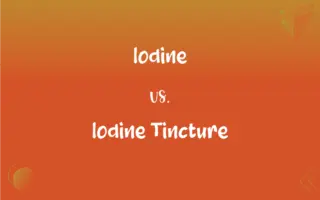Character vs. Conduct: What's the Difference?
Edited by Janet White || By Harlon Moss || Published on February 24, 2024
Character refers to a person's inherent qualities and moral nature, while conduct is the manner in which a person behaves or acts.

Key Differences
Character encompasses the intrinsic qualities, values, and traits that define a person's moral and ethical nature. Conduct, on the other hand, refers to the external actions and behavior that a person exhibits.
Character is often considered stable and enduring, forming the backbone of an individual's moral compass. Conduct, in contrast, can vary depending on circumstances and may not always reflect one’s character.
Character shapes how an individual perceives the world and influences their choices. Conduct is the manifestation of these choices in real-world actions and interactions.
Character is a deep-seated aspect of one's personality and is often developed over time through experiences and personal growth. Conduct can be more immediately observable and may be influenced by external factors such as societal norms or peer pressure.
Character is the essence of who a person truly is, often judged based on principles and values. Conduct is how this essence is expressed in day-to-day life through actions and decisions.
ADVERTISEMENT
Comparison Chart
Definition
Inherent qualities and moral nature
Observable actions and behaviors
Stability
Generally stable and enduring
Can vary with situations
Source
Internal, based on values and beliefs
External, influenced by environment and context
Development
Cultivated over a lifetime
Shaped by immediate circumstances
Reflection
Reflects inner moral compass
Reflects interaction with the world
ADVERTISEMENT
Character and Conduct Definitions
Character
A printed or written letter or symbol.
Each character in this manuscript is carefully crafted.
Conduct
The manner in which a person behaves.
His conduct during the meeting was professional and courteous.
Character
The reputation of a person or thing.
The school has a character for academic excellence.
Conduct
To lead or guide someone to a place.
The guide will conduct us through the ancient ruins.
Character
A person in a novel, play, or movie.
The character of Sherlock Holmes is famous for his deductive reasoning.
Conduct
To direct the execution of a task.
She will conduct the orchestra at tonight's concert.
Character
The mental and moral qualities distinctive to an individual.
Jane's character of honesty was evident when she returned the lost wallet.
Conduct
The way in which an organization or activity is managed or directed.
The conduct of the election was fair and unbiased.
Character
A distinctive trait or attribute.
Her sense of humor is a key character of her personality.
Conduct
To transmit or guide (heat, electricity, etc.).
Copper wires conduct electricity efficiently.
Character
The combination of mental characteristics and behavior that distinguishes a person or group.
Conduct
To direct the course of; manage or control
A police officer who conducts traffic.
A scientist who conducts experiments.
Character
The distinguishing nature of something.
FAQs
Can conduct change over time?
Yes, conduct can change depending on circumstances and environment.
How is conduct different from character?
Conduct refers to the observable actions and behavior of a person, which may or may not reflect their character.
Does conduct always reflect character?
Not always. Conduct can be influenced by external factors and may not always align with one's character.
What is character?
Character is a set of inherent qualities that define a person's moral and ethical nature.
Is character fixed?
Character is relatively stable but can evolve with personal growth and experiences.
Can conduct be controlled?
Yes, individuals can control their conduct, though it may be influenced by external factors.
How does one assess another's character?
Through observing their actions over time and understanding their values and beliefs.
Can a person's conduct be misleading about their character?
Yes, conduct can sometimes give a false impression of a person's true character.
Is it possible for conduct to change while character remains the same?
Yes, conduct can change due to external influences without a fundamental change in character.
How is character developed?
Character is developed through life experiences, upbringing, education, and personal reflection.
Are character traits hereditary?
Some aspects of character may be influenced by genetics, but it is largely shaped by environmental factors.
How can one improve their character?
By self-reflection, learning, and striving to embody positive values and ethics.
Do people perceive character and conduct differently?
Yes, character is often perceived as an internal attribute, while conduct is observed externally.
How do cultural differences affect perceptions of character and conduct?
Different cultures have varied values and norms, which can influence how character and conduct are perceived and judged.
Is it easier to observe character or conduct?
Conduct is easier to observe as it involves external actions, while character requires deeper insight into a person's values and beliefs.
Can a person's character influence their conduct?
Yes, a person's inherent qualities and moral compass often guide their behavior and actions.
What role does society play in shaping conduct?
Society sets norms and expectations that can influence an individual's conduct.
Can someone have good character but poor conduct?
Yes, this can occur if external pressures or situations lead to behavior not reflective of their character.
Is character a factor in professional success?
Yes, character traits like integrity and reliability are often important for professional success.
Can education influence a person's character?
Yes, education can play a significant role in shaping a person's values and ethical viewpoints.
About Author
Written by
Harlon MossHarlon is a seasoned quality moderator and accomplished content writer for Difference Wiki. An alumnus of the prestigious University of California, he earned his degree in Computer Science. Leveraging his academic background, Harlon brings a meticulous and informed perspective to his work, ensuring content accuracy and excellence.
Edited by
Janet WhiteJanet White has been an esteemed writer and blogger for Difference Wiki. Holding a Master's degree in Science and Medical Journalism from the prestigious Boston University, she has consistently demonstrated her expertise and passion for her field. When she's not immersed in her work, Janet relishes her time exercising, delving into a good book, and cherishing moments with friends and family.






































































